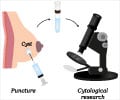Scientists at Cold Spring Harbor Laboratory (CSHL) have found that a protein called Scribble is an important regulator of breast cancer.
Scientists at Cold Spring Harbor Laboratory (CSHL) have found that a protein called Scribble is an important regulator of breast cancer.
The researchers have revealed that they originally discovered the protein while conducting experiments with fruit flies and worms, in which it was found to regulate the shape of cells.It may be significant to note the cells lining the breast's ducts have a certain shape that is required to maintain both organ structure and function, and that all breast cancers display a loss of this characteristic organization.
The researchers have revealed that normal function of Scribble protein allows breast epithelial cells to form duct-like structures and resist cancer formation.
According to them, the tissue loses its shape and cancers ensue when Scribble stops functioning.
"(The discovery identifies) a new paradigm for understanding how cancer initiates," says CSHL Professor Senthil Muthuswamy, who headed the team that conducted the research.
The significance of this study lies in the fact that it constitutes first steps toward identifying an entirely new class of molecules and pathways that can be targeted by anti-cancer therapies to prevent pre-cancerous lesions from turning into malignant tumours.
He says that proteins that control cell number and regulate cell structure are both critical in cancer development, and thus carcinomas--cancers derived from epithelial cells in organs such as breast, ovary, prostate, lung and pancreas--should be approached as a problem of "deregulated morphogenic processes and not just as a disease of increased cell number."
Source-ANI
SRM
 MEDINDIA
MEDINDIA




 Email
Email










